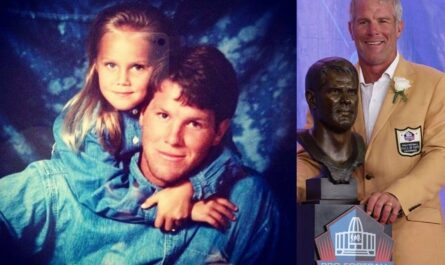**Brett Favre’s Strategies for Managing Exhaustion**
[bg_collapse view=”button-orange” color=”#4a4949″ expand_text=”Show More” collapse_text=”Show Less” ]
Brett Favre had one of the most storied careers in NFL history, spending 20 seasons as a quarterback and starting an incredible 321 consecutive games. However, playing at such a high level year after year placed immense physical and mental demands on his body. As his career progressed, Favre developed effective strategies to cope with the relentless exhaustion that comes with being an NFL quarterback. Through prioritizing recovery, maintaining overall wellness, and utilizing a strong support system, Favre was able to maximize his performance and extend his career longevity.
**Prioritizing Sleep**
One of Favre’s most important strategies was prioritizing quality sleep each night. As a quarterback, his body and mind faced constant wear and tear over the course of long seasons. Sleep is one of the best ways for the body to recover from physical and mental exertion, so Favre made getting adequate sleep a top priority. He aimed for 8-10 hours of sleep per night, even during the demanding NFL season when many players struggle to get enough rest.
Favre understood that consistency was key, so he established a regular sleep schedule that allowed his body to get into a natural rhythm. He went to bed and woke up at the same times each day, even on weekends and off days. This consistency helped him feel well-rested and prepared for practice and games. Favre also made sure to create a conducive sleep environment by keeping his bedroom cool, dark, and free of distractions like electronics. Having a relaxing pre-bedtime routine further helped him fall asleep quickly and easily each night.
**Nutrition and Hydration**
In addition to prioritizing sleep, Favre paid close attention to his nutrition and hydration. He understood the importance of fueling his body with the right nutrients to support his high performance and aid in recovery. Favre maintained a healthy diet rich in fruits, vegetables, whole grains, lean proteins, and healthy fats. This provided him with sustained energy throughout the day as well as essential vitamins, minerals, and antioxidants.
As a quarterback, Favre relied heavily on his upper body strength. To help build and maintain muscle mass, he ensured adequate protein intake at each meal, especially after workouts. Staying properly hydrated was also a top priority for Favre. He drank water regularly throughout practice and games to replace fluids lost from sweating. Even on his days off, Favre consumed plenty of water to support his body’s recovery processes. Staying hydrated also helped him feel energized and focused on the field.
**Active Recovery**
While complete rest is important, Favre understood that some light physical activity could aid his recovery on non-practice days. Instead of sitting around, he engaged in gentle recovery workouts like walking, swimming, or stationary biking. These activities helped promote blood flow to his muscles, which sped up the removal of waste products from previous workouts. They also reduced muscle soreness and kept his joints mobile.
Favre’s recovery workouts were very low impact and never pushed his body too hard. The goal was to get his blood pumping without adding additional strain. Activities like walking were perfect for this, as they provided a mental break as well. Getting fresh air and enjoying nature during his recovery workouts left Favre feeling recharged both physically and mentally.
**Mental Relaxation Techniques**
As an NFL quarterback, Favre faced immense mental demands and stresses each week. To unwind his mind, he utilized various relaxation techniques. Deep breathing exercises were a staple of Favre’s routine. Taking slow, deep breaths lowered his heart rate, relaxed his muscles, and eased his mind. Meditation was another strategy he employed. Sitting quietly and focusing on his breathing for 10-15 minutes helped Favre shift out of a stressed mindset.
Spending quality time with loved ones also provided important mental relaxation for Favre. Surrounding himself with family and friends allowed him to laugh, share stories, and simply enjoy life outside of football. Activities like fishing, hunting, and playing with his children took Favre’s mind off the game completely. Their unconditional love and support left him feeling recharged both mentally and emotionally.
**Massage and Physical Therapy**
Regular massage sessions were an essential part of Favre’s recovery regimen. Getting deep tissue work on his muscles helped relieve tension built up from intense practices and games. Massage also improved blood flow and sped healing of minor injuries. Physical therapy further aided Favre’s recovery when needed. If he experienced any muscle imbalances, strains, or other issues, physical therapy addressed the underlying causes. Strengthening and flexibility exercises corrected any deficiencies and reduced his risk of future injuries.
Staying on top of potential physical issues kept Favre performing at an optimal level throughout his career. Both massage and physical therapy played a role in maintaining his overall well-being and quality of life, even after retiring from football. Favre’s commitment to his physical health undoubtedly contributed to his record-setting career longevity.
**Time Management**
As an NFL quarterback, Favre had to juggle countless responsibilities both on and off the field. To avoid becoming overwhelmed, he prioritized time management. Each week, he would sit down and schedule all of his tasks, whether it was film study, workouts, meetings, or family commitments. Blocking out specific times for each activity kept him organized and prevented procrastination.
Favre also scheduled regular breaks throughout his day to recharge his mind and body. Taking even 15-20 minutes away from work duties every couple of hours helped him avoid burnout. He may spend this time relaxing with a book, calling his wife, or simply closing his eyes for a few minutes. Delegating non-essential tasks to coaches and teammates further reduced stress on Favre’s plate. His efficient time management allowed him to balance his football commitments with important self-care.
**Support System**
No athlete can succeed in such an intense career alone. Favre understood the importance of surrounding himself with a strong support network. His coaches, trainers, teammates, and family provided encouragement, motivation, and practical assistance to help him manage exhaustion. Coaches created individualized workout programs and monitored his workload to reduce injury risk. Trainers provided massage, rehab, and nutritional guidance. Teammates formed a brotherhood that kept things lighthearted.
However, Favre’s most important supports were his wife Deanna and their children. They created a stable home environment where he could unwind from the stresses of football. Deanna took care of domestic responsibilities so Favre could fully focus on his recovery. His kids brought endless joy and kept him grounded outside of sports. Having such a caring network to lean on during difficult times empowered Favre to push his limits season after season.
**Self-Awareness and Listening to His Body**
Throughout his career, Favre learned to closely monitor how his body responded to the demands of football. He paid attention to subtle signals like increased soreness, fatigue, or loss of focus. If he felt overly tired, Favre took the initiative to rest instead of stubbornly pushing through. Listening to these warning signs prevented potential injuries and burnout.
Favre also wasn’t afraid to take an occasional rest day even when he felt good. He understood the value of giving his body a break before stresses accumulated. Coaches respected his self-awareness and didn’t question his decisions to sit out a practice. Favre’s in-tune approach to his physical and mental limits served him well. It allowed him to sustain peak performance for two full decades in the NFL.
**Perspective and Gratitude**
No matter how exhausted he felt after games and long practices, Favre maintained a positive perspective. He focused on the joy and fulfillment that football brought to his life. Rather than stress over losses or mistakes, Favre chose to be grateful for each opportunity to compete. Having perspective kept him motivated even through difficult injuries or slumps. Favre expressed thanks regularly for his health, career, supportive family, and fans. Maintaining an attitude of gratitude counteracted the negativity of exhaustion. It empowered him to handle challenges with resilience.
**Post-Career Adjustments**
After retiring in 2011, Favre’s body no longer faced the same intense demands. However, adjusting to life without football was a transition that required its own form of self-care. Favre gradually reduced his daily physical activity to avoid injury as he aged. He also shifted his sleep schedule to match a less rigorous lifestyle. While relaxing more, Favre still prioritized healthy habits like nutrition, hydration, and stress management learned during his playing days.
Staying active through hobbies like golf helped Favre avoid becoming sedentary. Spending quality time with loved ones continued providing mental relaxation as well. Even in retirement, Favre demonstrated the importance of adapting recovery strategies to fit one’s current phase of life. His diligent approach to self-care empowered decades of success and an enjoyable post-football chapter.
**Conclusion**
Through implementing a multifaceted strategy, Brett Favre managed to cope with immense physical and mental exhaustion over his legendary NFL career.
[/bg_collapse]



